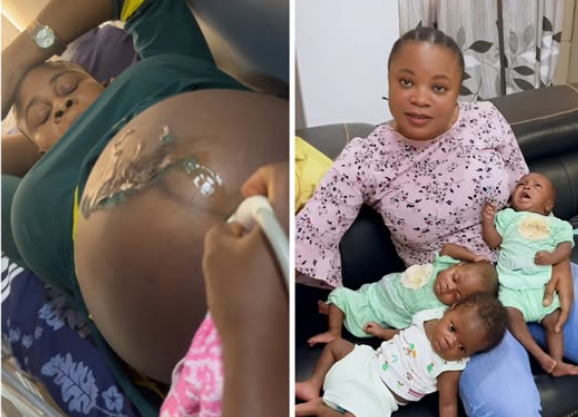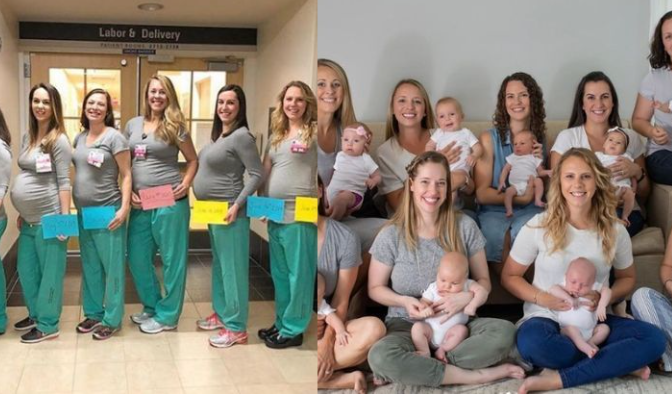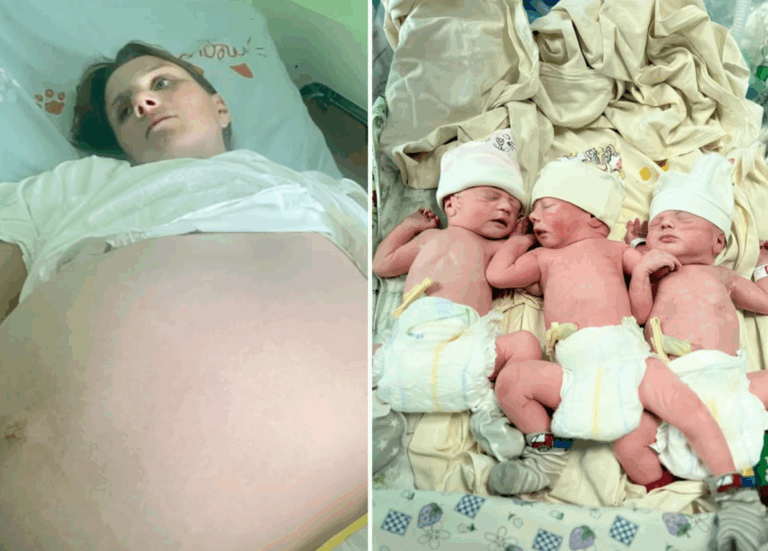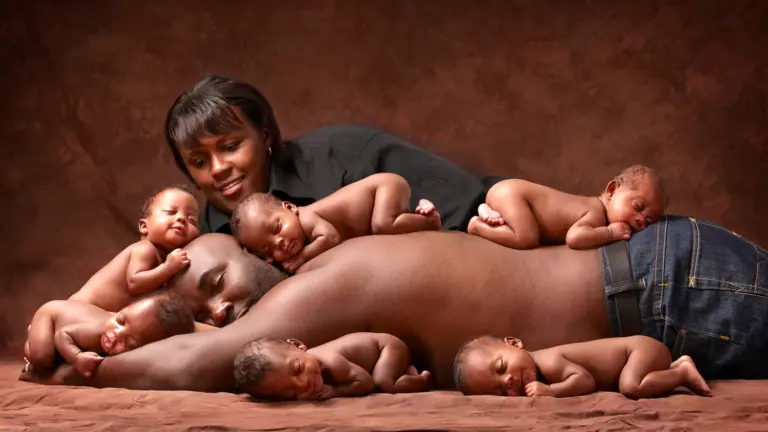Wings of Valor
Willow Creek International Airport buzzed with summer chaos, its terminal alive with rolling suitcases and flickering departure boards. At Gate 12, the Thompson family—Michael, a 38-year-old Black software engineer, his tailored blazer crisp; Susan, a 36-year-old Black pediatrician, her sundress vibrant; and their 9-year-old twins, Zoe and Lila, pigtails bouncing, unicorn backpacks glittering—approached the first-class boarding lane, tickets in hand. This Miami vacation, a rare treat earned through years of grit, was their moment of joy. But as they reached the counter, gate agent Karen Wheeler, her blonde bob neat, her smile thin, stopped them, her eyes narrowing at their skin. “Step aside,” she said, her voice sharp. “We need to verify your tickets.”
Michael’s hand tightened on the tickets, his voice steady. “Verify? They’re first-class, confirmed,” he said, his engineer’s precision cutting through her tone. Susan’s hand rested on Zoe’s shoulder, her smile fading, her eyes sensing bias. Karen’s colleague, Brad Coleman, smirked, his headset dangling, his gaze hostile. “They don’t look right,” Karen said, her scanner beeping green, yet she gestured to a side area. “Wait there.” Zoe’s voice trembled, her pigtails still. “Daddy, why can’t we go?” Lila’s lip quivered. “Did we do something wrong?” Susan knelt, her sundress pooling. “No, sweeties,” she soothed, her heart breaking.
Michael’s jaw clenched, the crowd’s whispers—probably fake—igniting a fire. “The scanner confirmed our tickets,” he said, his blazer creasing. “We’re professionals—engineer, doctor. What’s the real issue?” Karen’s face flushed, her voice defensive. “Tickets can be stolen,” she said, Brad nodding. “Don’t make this hard.” Michael pulled out his phone, dialing customer service, his voice resolute. “This is racial bias,” he said, his watch glinting, a symbol of his success. “I need a supervisor, now.” Karen stammered, Brad’s smirk faded, the terminal’s tension a spark ready to ignite.

Diane Harper, a 45-year-old airline manager, arrived, her navy suit sharp, her badge gleaming. She scanned the tickets, her voice firm. “They’re valid. You’re cleared to board.” Turning to Karen and Brad, her eyes hardened. “This is misconduct. You’re on report.” The crowd murmured, some filming, others nodding—about time. Karen’s apology was hollow, Brad’s forced, their badges dull. Michael’s voice rose, his hand on Susan’s. “This wasn’t a mistake—it was deliberate. You saw our skin, not our tickets, and scared my daughters.” Diane nodded, her voice strained. “We’ll investigate.” But Michael’s eyes burned. “It’s your system—fix it.”
The Thompsons boarded, their first-class seats cold, Zoe and Lila’s eyes wary, their unicorn keychains clutched. “Will they be mad again?” Zoe whispered. Lila added, “I don’t like planes.” Susan’s voice cracked, her sundress bright but her heart heavy. “You’re safe now,” she said, Michael’s hand on hers, his vow silent: This isn’t over.
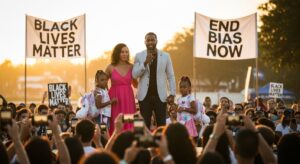
In Miami, the Thompsons’ wound lingered, their hotel suite’s ocean view no balm for Zoe and Lila’s fear. Michael’s phone buzzed—Laura Bennett, airline VP, offered refunds and vouchers. “Not enough,” Michael said, his voice sharp. “My girls were humiliated. I want a public investigation, policy changes.” Laura faltered, promising a review, but Michael hung up, his resolve ironclad. A viral video from Gate 12, filmed by a passenger, exploded on X, its caption stark: Family Denied for Being Black. Hashtags #JusticeForThompsons and #EndAirlineBias trended, the airline’s silence deafening.
At a Miami cultural festival, the Thompsons took a stage, Michael’s blazer crisp, Susan’s sundress glowing, Zoe and Lila’s pigtails bouncing. “We were denied our rights for our skin,” Michael said, his voice thunderous, the crowd cheering. Zoe spoke, her keychain gleaming. “I just wanted a vacation.” Lila echoed, “We weren’t bad.” The crowd’s empathy swelled, their phones capturing a family’s courage. Aisha Coleman, a Black journalist, approached, her dreadlocks elegant, her pen ready. “I’ll amplify your story,” she said, her Miami Herald article poised to shake the industry.
Back in Willow Creek, Karen and Brad faced hearings, their excuses crumbling, Diane’s oversight questioned. A cryptic message hit Michael’s phone: Gate 12 won’t be forgotten. Meet me in Miami. At a downtown conference room, David Langston, Horizon Airlines’ CEO, apologized, his gray suit somber. “Karen and Brad are terminated,” he said. “We’re launching anti-bias training, revising policies, and creating Thompson Wings, a fund for equity.” Michael nodded, his voice firm. “Ensure it lasts.” Susan added, “Our girls need a future without fear.” Zoe and Lila smiled, their voices brave. “We’re strong now.”
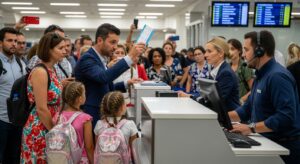
Aisha’s article hit, detailing Gate 12’s shame, the videoWings of Justice – Part 1
The Willow Creek International Airport buzzed with the chaos of summer travel, its gleaming terminal a swirl of rolling suitcases, flickering departure boards, and the hum of anticipation. At Gate 12, where the flight to Miami awaited, a line of passengers shuffled toward the first-class boarding lane, their premium tickets clutched like badges of privilege. Among them stood the Thompson family: Michael Thompson, a 38-year-old Black software engineer, his tailored blazer crisp, his eyes calm but vigilant; Susan Thompson, a 36-year-old Black pediatrician, her sundress vibrant, her smile warm but strained; and their twin daughters, Zoe and Lila, both 9 years old, their braided pigtails bouncing, their matching backpacks emblazoned with glittery unicorns. Their first-class tickets, a hard-earned treat for a family vacation, were clutched in Michael’s hand, their barcodes gleaming under the terminal’s fluorescent lights. But as they approached the boarding counter, the air shifted, a shadow of prejudice descending like a storm.
The gate agent, a middle-aged white woman named Karen Wheeler, stood behind the counter, her navy uniform pressed, her blonde bob neat, her smile practiced but thin. Her colleague, a younger white man named Brad Coleman, scanned tickets nearby, his headset dangling, his eyes darting with a mix of boredom and scrutiny. As the Thompsons stepped forward, Karen’s smile faltered, her eyes narrowing at Michael’s blazer, Susan’s dress, the girls’ backpacks, and the unmistakable hue of their skin. She held up a hand, her voice sharp but cloaked in politeness. “Excuse me,” she said, her tone clipped, her hand gesturing to the side. “Please step over here. We need to verify your tickets.”
Michael paused, his hand tightening on the tickets, his eyes meeting Karen’s, sensing the weight behind her words. “Verify?” he said, his voice steady, his brow furrowing. “These are first-class tickets, purchased and confirmed. What’s the issue?” He handed over the tickets, his posture calm but firm, his engineering precision mirrored in his measured tone. Susan placed a hand on Zoe’s shoulder, her smile fading, her eyes scanning the counter, her medical instinct picking up the subtle hostility in Karen’s gaze.
Karen took the tickets, her fingers slow, her eyes flicking to Brad, who smirked, his headset now off, his attention fixed on the family. “These… don’t look right,” Karen said, her voice low, her smile gone, her words laced with insinuation. “First class is highly selective. We’ve had issues with… discrepancies before.” She scanned the tickets, her scanner beeping green, confirming their validity, but her expression hardened, her hand gesturing to a side area. “Please, wait there. We’ll sort this out.”
Zoe’s eyes widened, her pigtails still, her voice small but clear. “Daddy, why can’t we go?” she asked, her unicorn backpack slipping, her hand clutching Lila’s. Lila’s lip trembled, her eyes on Karen, her whisper soft. “Did we do something wrong?” Susan knelt, her sundress pooling, her voice soothing but strained. “No, sweeties, you didn’t,” she said, her hand stroking Lila’s cheek, her eyes meeting Michael’s, a silent plea for calm. But Michael’s jaw tightened, his heart pounding, the whispers of nearby passengers—probably fake, who are they kidding—igniting a fire he couldn’t ignore.
“Discrepancies?” Michael said, his voice rising, his blazer creasing as he stepped closer to the counter, his eyes locked on Karen’s. “The scanner confirmed our tickets. We paid for first class, fair and square. My wife and I are professionals—engineer, doctor. These are our daughters. What’s the real problem here?” His words were sharp, his tone controlled but laced with a challenge, his years of navigating subtle slights sharpening his clarity: this wasn’t a glitch; it was bias, raw and deliberate.
Karen’s face flushed, her hands fumbling the tickets, her voice a mix of defiance and feigned concern. “Sir, don’t raise your voice,” she said, her eyes darting to Brad, who stepped closer, his smirk fading, his hand on his radio. “We’re just doing our job. Tickets like these… sometimes they’re stolen, or forged. We have to be thorough.” Her words hung heavy, the implication clear, the crowd’s murmurs growing—stolen, typical, they don’t belong. Brad nodded, his voice low but cutting. “Just step aside, sir. Don’t make this harder than it needs to be.”
Susan stood, her hand on Michael’s arm, her voice soft but urgent. “Michael, let’s not escalate,” she said, her eyes on Zoe and Lila, whose faces were etched with confusion, their backpacks heavy, their excitement for Miami fading. “We’ll sort it out calmly.” But Michael shook his head, his hand gentle on hers, his voice resolute. “No, Susan,” he said, his eyes on Karen, then Brad. “This isn’t about tickets. It’s about us, our skin, our right to be here. I’m not letting this slide.”
The crowd parted, passengers staring, some whispering, others filming, the terminal’s hum a backdrop to a standoff. Michael pulled out his phone, his fingers swift, his voice steady as he dialed the airline’s customer service hotline, his blazer sleeve rising, his watch glinting—a gift from a promotion earned through years of grit. “This is Michael Thompson,” he said, his voice clear, his eyes on Karen, who stiffened, her scanner forgotten. “I’m at Willow Creek Airport, Gate 12, with my family. We’re being denied first-class boarding despite valid tickets, and I believe it’s due to racial bias. I need a supervisor, now.”
Karen’s eyes widened, her hands dropping the tickets, her voice a stammer. “That’s not necessary,” she said, her face red, her authority crumbling. Brad’s radio crackled, his hand hesitating, his smirk replaced by unease. Susan held Zoe and Lila close, her sundress bright but her eyes fierce, her heart torn between calm and outrage, her daughters’ questions—Why don’t they like us?—cutting deeper than any insult. The hotline’s hold music played, a supervisor’s voice imminent, but the terminal’s tension was a powder keg, and as a figure approached from the crowd—unseen but purposeful—the Thompsons’ fight for justice was about to ignite a truth that Willow Creek’s skies couldn’t contain.
———————————————–
Wings of Justice – Part 2
The Willow Creek International Airport’s Gate 12 was a cauldron of tension, its fluorescent lights casting stark shadows over a crowd of passengers, their whispers and smartphones amplifying the standoff at the first-class boarding counter. Michael Thompson, a 38-year-old Black software engineer, stood with his tailored blazer creased, his first-class tickets clutched, his eyes burning into the gate agents, Karen Wheeler and Brad Coleman, whose prejudice had barred his family from boarding. Susan Thompson, a 36-year-old Black pediatrician, held their twin daughters, Zoe and Lila, both 9 years old, their braided pigtails still, their unicorn backpacks heavy, their faces etched with confusion and fear. Michael’s call to the airline’s customer service hotline crackled through his phone, his demand for a supervisor a spark in a powder keg, the crowd’s murmurs—stolen tickets, they don’t belong—a wound that refused to close.
The terminal’s hum parted as a woman in a navy suit strode forward, her heels clicking, her badge gleaming: Diane Harper, a 45-year-old white airline manager, her auburn hair pulled back, her expression a mix of authority and urgency. The crowd hushed, Karen’s face paling, her blonde bob trembling, her scanner forgotten. Brad’s hand dropped from his radio, his smirk gone, his headset dangling. Michael lowered his phone, his voice steady but sharp. “Ms. Harper,” he said, reading her badge, his blazer sleeve rising, “we’ve been denied boarding despite valid first-class tickets. Your agents suggested our tickets are stolen or fake. I want an explanation.”
Diane’s eyes flicked to Karen, then Brad, her lips tightening, her hand gesturing for the tickets. “Let me see them,” she said, her voice calm but firm, her scanner beeping green as she checked, her brow furrowing at the confirmation of their validity. “These are legitimate,” she said, her tone clipped, her eyes meeting Michael’s, then Susan’s, whose sundress glowed but whose grip on Zoe and Lila tightened, her medical precision noting the girls’ trembling hands. “There’s no issue here. You’re cleared to board first class, as ticketed.”
Karen stammered, her hands fumbling, her voice a whisper. “Ma’am, we were just… verifying,” she said, her face red, her authority crumbling. Brad nodded, his voice low. “Standard procedure,” he muttered, his eyes on the floor, his earlier bravado a ghost. Diane’s gaze hardened, her hand raised, her voice cutting. “Enough,” she said, her eyes boring into them. “You delayed a family with valid tickets, caused a scene, and embarrassed this airline. This isn’t verification—it’s misconduct. You’re both on report, and we’ll discuss this further in my office.”
The crowd murmured, phones recording, passengers shifting, some nodding, others whispering—about time, they went too far. Karen’s shoulders slumped, her bob limp, her voice a mumble. “I’m… sorry,” she said, her eyes avoiding Michael’s, her apology hollow. Brad cleared his throat, his headset off, his voice strained. “Yeah, sorry,” he said, his hands in his pockets, his remorse forced. Diane gestured to the boarding lane, her voice softer but firm. “Mr. and Mrs. Thompson, please, board with your daughters. We’ll ensure your comfort.”
Susan exhaled, her sundress swaying, her hand guiding Zoe and Lila, whose pigtails bounced, their backpacks heavy, their eyes wide but wary. “Thank you,” she said, her voice calm but strained, her pediatrician’s instinct shielding her girls, their questions—Why didn’t they like us?—still unanswered. But Michael stood firm, his blazer creased, his tickets returned, his voice rising, his engineer’s clarity a blade. “No,” he said, his eyes on Diane, then Karen, then Brad, the crowd’s phones capturing every word. “A sorry isn’t enough. This wasn’t a mistake—it was deliberate. You didn’t see tickets; you saw our skin, assumed we couldn’t belong in first class, accused us of theft in front of our daughters, in front of everyone.”
Diane’s face tightened, her badge glinting, her voice measured. “Mr. Thompson, I assure you, we’ll investigate,” she said, her hand gesturing for calm, her authority tested. But Michael shook his head, his hand on Lila’s shoulder, her unicorn backpack a reminder of her innocence, his voice resonant. “Investigate?” he said, his eyes sweeping the crowd, their phones a silent jury. “This isn’t just about your agents. It’s your system—training that fails, policies that let bias fester, assumptions that humiliate families like mine. My girls heard every word—stolen, fake, don’t belong. They’re 9 years old, and you’ve taught them they’re less because of their skin. That’s not an error; that’s a failure.”
Zoe’s eyes glistened, her pigtails still, her voice small. “Daddy, are we in trouble?” she asked, her hand clutching Susan’s, her backpack slipping. Lila’s lip trembled, her eyes on Michael, her whisper soft. “Why did they say we stole?” Susan knelt, her sundress pooling, her voice soothing but breaking. “You’re not in trouble, sweeties,” she said, her hand stroking Zoe’s cheek, her eyes meeting Michael’s, her heart torn by their fear. “We’re okay now.” But her words faltered, her pediatrician’s calm cracking, her pain a mirror of Michael’s.
The crowd’s murmurs grew—he’s right, this is wrong, poor kids—some passengers nodding, others filming, the terminal’s tension a living thing. Diane’s jaw tightened, her voice firm but strained. “I understand your anger, Mr. Thompson,” she said, her badge a shield, her eyes on Karen and Brad, who stood silent, their apologies spent. “We’ll address this fully—training, accountability. Please, board now, and we’ll follow up.” She gestured to the lane, her hand steady, but Michael’s eyes burned, his resolve unyielding, his voice low but fierce. “We’ll board,” he said, his hand on Susan’s, “but this isn’t over. I’ll hold you to that accountability, for my family and every family you’ve wronged.”
The Thompsons moved to the jet bridge, their steps heavy, their first-class tickets a hollow victory, the crowd parting, some clapping softly, others filming, their whispers a mix of support and curiosity. Karen and Brad stood frozen, their badges dull, their careers teetering, Diane’s reprimand a shadow over them. The family boarded the Miami-bound flight, their first-class seats plush but cold, the cabin’s luxury a stark contrast to the weight in their hearts.
In the cabin, Zoe and Lila sat close, their backpacks stowed, their pigtails still, their eyes darting to the other passengers, whose glances—some kind, some curious, some averted—deepened their unease. Zoe clutched her unicorn keychain, her voice a whisper. “Will they be mad at us again?” she asked, her eyes on Susan, her fear a wound. Lila’s hand trembled, her voice soft. “I don’t like planes anymore,” she said, her eyes on Michael, her trust shaken. Susan’s hand covered theirs, her sundress bright but her voice thick. “You’re safe now,” she said, her heart breaking, her pediatrician’s strength tested by their pain.
Michael sat beside them, his blazer off, his watch glinting, his hand on Susan’s, his voice low. “I’m sorry, girls,” he said, his eyes glistening, his engineer’s precision yielding to a father’s grief. “You shouldn’t have to feel this. But we’re fighting for you, always.” His words were a vow, his resolve a fire, his call to customer service a seed now sprouting, its roots unseen but growing.
The plane’s engines roared, the cabin dimming, the Miami flight a journey tainted by a wound that lingered. Michael’s eyes met Susan’s, their pain shared, their love a shield for Zoe and Lila, whose fear was a scar no apology could erase. As the plane climbed, a message blinked on Michael’s phone, its sender unknown but its words stark: We’re aware of Gate 12. Expect action. The skies of Willow Creek parted, but the Thompsons’ fight was far from over, and a reckoning was rising faster than the plane itself.
—————————————–
Wings of Justice – Part 3
The Miami International Airport gleamed under the tropical sun, its palm-lined terminal a stark contrast to the cold hostility of Willow Creek’s Gate 12, but for the Thompson family, the wound from their ordeal lingered like a shadow. Michael Thompson, a 38-year-old Black software engineer, walked through the arrivals hall, his tailored blazer folded over his arm, his eyes scanning for their driver, his heart heavy with the memory of Karen and Brad’s prejudice. Susan Thompson, a 36-year-old Black pediatrician, held the hands of their twin daughters, Zoe and Lila, both 9 years old, their braided pigtails drooping, their unicorn backpacks a reminder of a vacation tainted before it began. The first-class flight had been plush, but the cabin’s heavy silence, Zoe’s fearful whispers, and Lila’s trembling hands had turned luxury into a battlefield, and Michael’s resolve to fight for justice burned brighter than Miami’s sun.
As they reached the baggage claim, Michael’s phone buzzed, the airline’s customer service number flashing, a follow-up to his Gate 12 complaint. He answered, his voice steady but sharp. “Michael Thompson,” he said, his blazer sleeve rising, his watch glinting—a symbol of his hard-earned success. The voice on the line, a woman named Laura Bennett, vice president of customer experience, was polished but cautious. “Mr. Thompson, I’m deeply sorry for the incident at Willow Creek,” she said, her tone rehearsed. “Our manager, Diane Harper, confirmed your tickets were valid. We’d like to offer a full refund, upgraded vouchers, and a formal apology to your family.”
Michael’s jaw tightened, his hand on Lila’s backpack, her eyes still wary, her question—Why don’t they like us?—echoing in his mind. “A refund?” he said, his voice low, his engineer’s precision cutting through her offer. “Ms. Bennett, your agents humiliated us, accused us of theft, scared my daughters, all because we’re Black. This isn’t about money—it’s about a system that lets bias thrive. I want a public investigation, policy changes, and accountability, not vouchers.” Susan nodded, her sundress swaying, her pediatrician’s calm masking her anger, her hand squeezing Zoe’s, whose pigtails trembled, her unicorn keychain clutched tight.
Laura’s voice faltered, her polish cracking. “We’re reviewing the incident, Mr. Thompson,” she said, her words careful. “We’ll ensure it’s addressed internally.” But Michael shook his head, his eyes on his family, their vacation now a mission. “Internally isn’t enough,” he said, his voice rising, the baggage claim’s hum fading. “This was public—hundreds saw it, filmed it. My girls deserve better. I’ll take this to the media, the FAA, wherever it takes to fix your airline.” He hung up, his hand trembling, his resolve a fire, Susan’s eyes meeting his, her pride a silent strength.
By evening, at their oceanfront hotel, the Thompsons settled into a suite, its balcony overlooking Miami’s turquoise waves, but the view couldn’t lift the weight in their hearts. Zoe and Lila sat on the couch, their backpacks open, their coloring books untouched, their eyes distant. “Are we still in trouble, Mommy?” Zoe asked, her pigtails still, her voice small, her unicorn keychain a talisman against fear. Lila’s lip trembled, her hands folded, her whisper soft. “Will they stop us again when we go home?” Susan knelt, her sundress pooling, her voice soothing but strained. “No, sweeties,” she said, her hand stroking Lila’s cheek, her heart breaking. “Daddy’s making sure it won’t happen again.”
Michael stood by the balcony, his blazer off, his phone buzzing with notifications, his engineer’s mind racing. A video from Willow Creek’s Gate 12, filmed by a passenger, had gone viral on X, its caption stark: Family Denied First Class for Being Black. The clip showed Karen’s insinuations, Brad’s smirk, Michael’s defiance, and Diane’s intervention, amassing millions of views, hashtags like #JusticeForThompsons and #EndAirlineBias trending. Comments flooded—This is disgusting, sue them, poor kids—the pressure mounting on the airline, its official account silent but tagged relentlessly.
Susan joined him, her hand on his arm, her voice soft but fierce. “Michael, this is bigger than us now,” she said, her eyes on the waves, her pediatrician’s empathy fueling her resolve. “People are listening. We can’t let this fade.” Michael nodded, his hand covering hers, his voice low. “I won’t,” he said, his eyes glistening, his daughters’ fear a wound he’d fight to heal. “This vacation was for them, but now it’s for every family facing this. We’ll speak out.”
The next day, at a Miami community event—a cultural festival celebrating Black heritage, hosted at a vibrant plaza—the Thompsons stood on a small stage, their family united, their story a beacon. Michael held a microphone, his blazer crisp, his voice resonant, Zoe and Lila beside him, their pigtails bouncing, their backpacks bright, Susan’s sundress glowing, her hand on their shoulders. “We’re the Thompsons,” he said, his eyes sweeping the crowd, their phones raised, their cheers warm. “At Willow Creek Airport, we were denied our rights, humiliated for our skin, in front of our daughters. This isn’t just our story—it’s a system that fails too many. We’re demanding change, for Zoe, Lila, and every child who deserves better.”
The crowd roared, their applause thunderous, banners waving—Black Lives Matter, End Bias Now. Zoe clutched her keychain, her voice small but brave as she spoke, coached by Susan. “I just wanted to go on vacation,” she said, her pigtails swaying, her eyes shining. “Why didn’t they like us?” Lila nodded, her whisper amplified. “We weren’t bad.” The crowd’s cheers softened to murmurs, their empathy palpable, Susan’s eyes glistening, her hand tightening, Michael’s arm around them, his pride a fortress.
From the crowd, a woman approached, her dreadlocks elegant, her press badge glinting: Aisha Coleman, a 40-year-old Black investigative journalist, her X account a platform for justice, her reputation fierce. “Mr. Thompson,” she said, her voice warm but urgent, her notebook open. “I’ve seen the video, followed your story. I’m with the Miami Herald and national outlets. Your family’s courage is a spark. I’d like to amplify it—interviews, exposés, pressure on the airline. Will you work with me?”
Michael’s eyes met Susan’s, their nod silent but firm, Zoe and Lila’s faces brightening, their fear easing under Aisha’s kindness. “Yes,” Michael said, his voice steady, his blazer creasing as he shook her hand. “Let’s show the world what’s at stake.” Aisha smiled, her pen moving, her promise a lifeline, the crowd’s cheers a wave lifting the Thompsons higher.
Back in Willow Creek, the airline’s office was a storm of chaos, Diane Harper’s desk buried in reports, Karen and Brad summoned for questioning, their badges dull, their excuses unraveling. Karen’s voice trembled, her bob limp, her blame sharp. “Brad pushed me to question the tickets,” she said, her hands shaking, her career teetering. Brad’s face reddened, his headset off, his voice a snarl. “You started it, Karen! Don’t pin this on me!” Diane’s pen paused, her eyes narrow, her reprimand a prelude to consequences deeper than they feared.
As the Thompsons left the festival, Miami’s sunset painting the sky, Michael’s phone buzzed again, a new message from an unknown number, its words cryptic but bold: Gate 12 won’t be forgotten. Meet me in Miami tomorrow. The plaza’s music faded, but the Thompsons’ fight was soaring, and a reckoning was descending on Willow Creek’s skies, its wings unstoppable.
—————————————
Wings of Justice – Part 4
The Miami sunrise painted the ocean in hues of gold, its warmth a faint comfort for the Thompson family, whose fight for justice had transformed their vacation into a crusade. Michael Thompson, a 38-year-old Black software engineer, stood in the hotel suite’s balcony, his tailored blazer crisp, his watch glinting, his eyes on the cryptic message from last night: Meet me in Miami tomorrow. Susan Thompson, a 36-year-old Black pediatrician, sat with their twin daughters, Zoe and Lila, both 9 years old, their braided pigtails bouncing, their unicorn backpacks open, their coloring books a fragile shield against the fear instilled at Willow Creek’s Gate 12. The viral video, Aisha Coleman’s promise, and the community’s cheers had ignited a spark, but the Thompsons’ wound lingered, and Michael’s resolve to hold the airline accountable was a fire no apology could douse.
At 10 a.m., the family arrived at a sleek conference room in Miami’s downtown, its glass walls framing the city’s skyline, its table set for a meeting that carried the weight of their ordeal. Aisha Coleman, the 40-year-old Black journalist, stood by their side, her dreadlocks elegant, her press badge glinting, her notebook ready to amplify their story. The door opened, and David Langston, a 50-year-old white CEO of Horizon Airlines, entered, his gray suit sharp, his expression somber but resolute, flanked by Laura Bennett, the VP from the phone call, and a legal team, their briefcases a sign of stakes unseen. Michael’s hand tightened on Susan’s, Zoe and Lila’s eyes wide, their pigtails still, their trust fragile but growing under Aisha’s warmth.
“Mr. and Mrs. Thompson,” David began, his voice steady, his hands clasped, his eyes meeting theirs, “I’m here to address the incident at Willow Creek. On behalf of Horizon Airlines, I apologize unreservedly. Your family was wronged—humiliated, accused, denied your rights because of your race. This was a failure of our system, and I take full responsibility.” His words were heavy, the room silent, Laura’s face pale, the legal team’s pens still. Michael’s jaw tightened, his blazer creasing, his voice low but fierce. “Words aren’t enough, Mr. Langston,” he said, his eyes on Zoe and Lila, their unicorn keychains clutched. “Your agents scarred my daughters, taught them they’re less. I want accountability—public, systemic, lasting.”
David nodded, his hands gesturing to a tablet, his voice firm. “We’ve acted,” he said, his eyes sweeping the room. “Karen Wheeler and Brad Coleman have been terminated for misconduct. Diane Harper is under review for oversight failures. We’re launching mandatory anti-bias training across all staff, revising policies, and partnering with civil rights groups to audit our practices. Your family’s experience exposed a rot we’re uprooting.” He paused, his eyes on Michael, then Susan. “We’re also establishing a fund for community initiatives, named Thompson Wings, to honor your courage and support equity in travel.”
Susan’s eyes glistened, her sundress bright, her hand on Lila’s, her pediatrician’s empathy softening her voice. “That’s a start,” she said, her tone calm but resolute, her eyes on David. “But our girls need to know this won’t happen again—to anyone.” Zoe nodded, her pigtails swaying, her voice small but brave. “I don’t want other kids to be scared,” she said, her keychain gleaming, Lila echoing, “Me too.” The room softened, Aisha’s pen moving, David’s nod deep, his promise a vow.
As the meeting ended, Aisha’s article hit the Miami Herald’s front page, its headline bold: Family’s Fight Exposes Airline Bias. The piece detailed Gate 12, Karen’s insinuations, Brad’s complicity, and the Thompsons’ defiance, backed by the viral video, now at 10 million views. X erupted, hashtags #ThompsonWings and #EndAirlineBias trending globally, major networks picking up the story, the airline’s stock dipping, its board scrambling. Back in Willow Creek, Karen and Brad faced a disciplinary hearing, their badges revoked, their excuses—It was a mistake, we were stressed—crumbling under Diane’s testimony, her own career teetering, her silence at Gate 12 a regret she couldn’t erase.
That afternoon, at a televised press conference in Miami’s civic center, the Thompsons stood with David, Aisha, and a surprise figure: Marcus Reed, a 55-year-old Black civil rights lawyer, his suit impeccable, his presence commanding, revealed as the Gate 12 passenger who’d filmed the video. “I was there,” Marcus said, his voice resonant, his eyes on the cameras, the crowd’s cheers swelling. “I saw a family targeted for their skin. I’m working with the Thompsons to file a class-action lawsuit against Horizon, not for money, but for industry-wide reform. No family should face what they did.”
Michael took the microphone, his blazer sharp, his voice a thunderclap. “This isn’t just our fight,” he said, his eyes sweeping the crowd, Zoe and Lila beside him, their pigtails bouncing, Susan’s hand on his arm. “It’s for every person judged before they board, every child taught they don’t belong. We’re demanding a future where dignity isn’t a privilege.” Susan spoke, her sundress glowing, her voice steady. “Our girls are our why,” she said, her hand on Zoe’s shoulder, Lila’s keychain glinting. “They’re healing, and we’re fighting so they soar without fear.”
The crowd roared, cameras flashing, Aisha’s pen a beacon, David’s nod a commitment, Marcus’s briefcase a weapon for justice. Zoe and Lila smiled, their backpacks bright, their fear fading under the crowd’s love, their voices small but clear. “We’re okay now,” Zoe said, Lila echoing, “We’re strong.” The press conference trended, its impact rippling, airlines nationwide announcing reviews, the FAA pledging oversight, the Thompsons’ story a catalyst for change.
Days later, at a Miami beach, the Thompsons finally embraced their vacation, their laughter echoing as Zoe and Lila splashed in the waves, their pigtails wet, their unicorn keychains sparkling, their joy a victory. Michael and Susan sat on the sand, their hands entwined, their sundress and blazer a testament to their resilience. “We did it,” Susan said, her eyes on the girls, her heart full. Michael nodded, his watch glinting, his voice soft. “For them, for everyone.”
Back in Willow Creek, Horizon’s terminals buzzed with new signs—Dignity for All—and staff trained under Thompson Wings guidelines, their badges a reminder of a family’s valor. Aisha’s follow-up article chronicled the lawsuit’s progress, Marcus’s legal team growing, the industry shifting, the Thompsons’ name a symbol of justice. In Miami, a mural rose at the cultural plaza, depicting Zoe and Lila’s pigtails, Michael’s defiance, Susan’s strength, its caption bold: Wings of Justice Soar. The skies of Willow Creek and beyond were clearer, and the Thompsons’ fight had lifted a nation, their legacy a promise that no family would be grounded by prejudice again.
now at 10 million views. At a televised press conference, Marcus Reed, a Black civil rights lawyer who filmed the video, joined the Thompsons. “We’re filing a class-action lawsuit for industry reform,” he said, the crowd roaring. Michael spoke, his blazer sharp. “This is for every family judged before they board.” Susan’s voice glowed. “Our girls are our why.” Zoe and Lila beamed, their pigtails swaying, their fear fading.
On a Miami beach, the Thompsons laughed, Zoe and Lila splashing, their unicorn keychains sparkling. “We did it,” Susan said, her hand in Michael’s, his watch glinting. “For them, for everyone,” he replied. In Willow Creek, new signs—Dignity for All—adorned terminals, Thompson Wings shaping training, Aisha’s follow-up chronicling the lawsuit’s rise. A Miami mural rose, depicting the Thompsons, its caption bold: Wings of Valor Soar. The skies cleared, and the Thompsons’ fight lifted a nation, their legacy a promise that no family would be grounded by prejudice again.
